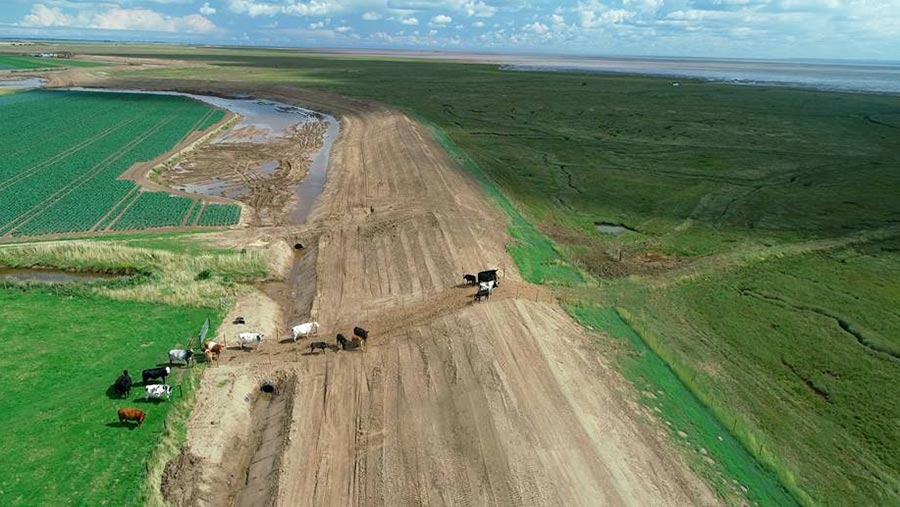Sea defences upgraded to protect farmland

A £1.8m sea defence project to protect 3,400ha of prime Grade 1 farmland has been completed in Lincolnshire.
Located at Wrangle, Boston, some 5km sea defence has been improved to reduce the risk of potentially catastrophic flooding for a consortium of 14 landowners and tenants.
See also: Maintaining sea walls – legal issues for farmers
It follows the collapse of adjacent sea defences during the tidal surge of December 2013.
The project involved a partnership between the landowners, Witham Fourth District Internal Drainage Board, the Environment Agency and Lincolnshire County Council.
One of the landowners protected is Hugh Drake, who grows 320ha of wheat, vining peas, brassicas and potatoes on the northern edge of the Wrangle project.
“The government’s recognition of the vulnerability of the sea defences on the western side of the Wash has been a great step forward,” said Mr Drake.
Single line of defence
“In those parts of the sea banks where there is only a single line of defence.
“The risks of flood damage to valuable farmland, residents and property, as well as the substantial business enterprises in the area, have now been addressed.”
Roythornes Solicitors partner Simeon Disley, who represented the landowners, said the improvements were helping to secure the economic future for the area.
“The scale of the challenge – together with the constraints on public expenditure – led to a new model of partnership and project management being created.”
For the first time, Environment Agency funds, together with European Union funding, were spent by the Internal Drainage Board acting as project leader.
The works were overseen by a project board made up of representatives of the partnership together with Natural England and the contractors.
Further drainage
Improvements involved reprofiling the sea banks and raising them to more than 7m high, with a rear slope leading to a further drainage system in case of particularly high tides.
The project was highly sensitive because the area sits alongside a Site of Special Scientific Interest (SSSI), so environmental considerations were crucial.
“We were also keen to retain as much of the important agricultural land as possible for grazing and food production,” said Mr Disley.
He added: “The sea defences can now keep pace with climate change to help protect the homes and businesses located on the Wash.”
Witham Fourth District IDB chief executive Peter Bateson said a major survey was carried out to collect environmental information before the project started.
“Crucially, the programme required the buy-in of all involved – particularly landowners and businesses, as well as the local community,” he said.
“We also were very conscious of our environmental commitments, and liaised closely with Natural England, RSPB and the Lincolnshire Wildlife Trust.”
